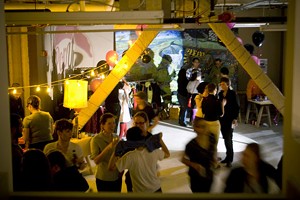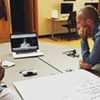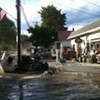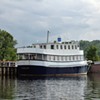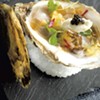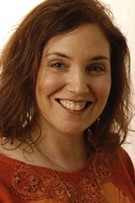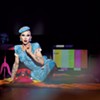Published May 16, 2012 at 11:30 a.m.
The knot of men smoking outside Charlie O’s in Montpelier is momentarily jarring to the eyes of a visitor arriving for Guerrilla Gay Bar, a lesbian “pop-up” event happening there on a recent Sunday night.
Inside, rapper Missy Elliot is blaring over the speakers. “Boys, boys, all types of boys…” The front of the bar is filled with boisterous middle-aged men playing pool and glancing more than occasionally toward the back. That’s where the “guerrillas” have gathered — about a dozen women clustered around a few tables sipping beer, horsing around and looking like they’re already friends. They have just finished up a round of Cornhole, a game in which players fling dusty beanbags toward holes cut out of old beer signs. Some of the women are at GGB for the first time, having come from as far as South Royalton.
Milling among them is lithe, kinetic Angela Emery, who started Guerrilla Gay Bar this winter so her “queer friends” could mingle. “I’m a firm believer in ‘make your own fun,’” says Emery, 33. It took little more than emailing some friends to get GGB started, and for a while the gathering alternated between Three Penny Taproom and Charlie O’s. Although Emery wasn’t a Charlie O’s regular, she found that bar more spacious, with free pool on Sundays. “It’s made Charlie O’s a fun place to be,” she says as she organizes another game of Cornhole.
Thus Emery became one of several young Vermonters who simultaneously launched pop-up gay bars this winter, without consciously coordinating their efforts. They’re nights when self-described queers take over a space for a few hours to socialize. In Colchester, there’s Pride Night at the club Venue, hosted every Thursday by Javier Zirko, aka DJ Papi Javi. Pop-Up Queer Dance Party is a nomadic event organized by Burlingtonians DJ Llu (Lluvia Mulvaney-Stanak) and Katie Dyer.
It’s been a momentous week, one in which North Carolina voters banned same-sex unions and President Barack Obama publicly endorsed same-sex marriage. But at Charlie O’s, the GGB vibe is mellow, more social than in-your-face. It’s a far cry from two weeks earlier, when Emery and the GGB crew migrated to Nutty Steph’s in Middlesex for a pop-up night of shimmering outfits, plates of bacon — it was “Bacon Thursday” — and vintage burlesque films.
The specter hanging over all these events is the 2006 closure of 135 Pearl, the beloved Burlington gay bar. Within weeks, the grandfather of pop-ups had started at Higher Ground in South Burlington: First Fridays, which are still running and usually packed.
“When [135 Pearl] was sold, the owner, Robert Toms, still wanted to have some event for the community, so he worked out this deal with Higher Ground to get the First Friday of every month committed to a gay night in the Showcase Lounge,” says Shawn Lipenski, who cohosts the night with Antara. Typically, live music attracts women earlier in the night. Later, DJs spin to a male-centric party that can draw 300 people, “from college-age kids all the way up to people in their sixties and seventies,” Lipenski says.
Though a replacement for 135 Pearl has not materialized, Lipenski says the need for a gay bar is perhaps less acute than it was before Vermont instituted the Marriage Equality Act. “There are few and far-between instances of any kind of homophobia. I think people are a lot more comfortable now than 10 years ago,” Lipenski says. “Though I still think there’s always a place for [gay nights], because people still want to hang out with each other.”
Is that the simple maxim that inspired Emery, Zirko, Mulvaney-Stanak and Dyer to create or host their own events? Here, they explain their motives — and comment on Vermont’s lack of a brick-and-mortar gay bar.
*****
Angela Emery started the informal Guerrilla Gay Bar in January. It runs every Sunday night at Charlie O’s in Montpelier, starting at 8 p.m.
I started Guerrilla Gay Bar because some of my queer-identified friends had expressed remorse about there not being a queer scene. I’ve definitely seen people who come here, who identify as queer, ask, “Where do the queer people hang out?” There was the population, but not the scene. So I decided to create something. I sent out a Doodle [survey] to 13 queer friends, asking, “OK, if you were going to have a nightly hangout, when would it be?”
It’s different every week. Sometimes we’ve had the whole bar, and sometimes it’s only 15 or 20 people. It’s exactly why we couldn’t have a gay bar; because if you can’t pack it each time, how could you? Ideally, people would like to see a bar, but our area couldn’t support something on that scale.
Being a female who presents as female, I don’t necessarily feel like I don’t belong. I don’t always “look gay.” This is not necessarily the case for my gender-queer friends. But I still feel there’s a need for solidarity and having a tribe; even if I live in a liberal place like Montpelier, it’s nice for me to go somewhere where I’m not always the minority, or one of the gay girls in the corner having a drink that everyone is “fine” with. I like that these are my people and I come here. It’s a really nice feeling.
This is not a moneymaker. I’m not getting paid. I just don’t like the idea of anyone, no matter how they identify, feeling like they don’t have a community.
*****
Javier Zirko, 31 — aka DJ Papi Javi — hosts Pride Night at Venue in Colchester. It runs every Thursday from 9 p.m. until 2 a.m. for those 18 and over.
I took over the event three weeks after it started, at the end of February. It was happening once a week, and so I went to check it out. Now I’m hosting it, and it gets better every week. Last night, we had 78 people.
[Pride Night] is for the entire community. We get a lot of women, which I was surprised by. It’s open for everybody, and it’s growing. I think it’s important as a party and a dance environment, but it’s also a way to reach a lot of young people. At Venue, all of the people I’m meeting now are people that I’ve never seen before.
The first time I walked into a gay bar, I was 22 or 23, when I was curious. I was happy back then that there was a place for me to be me, and not be judged by anyone. At the same time, in Vermont, we have such a great community that there are not many people bothered by gays. How do I feel now that we don’t have a gay bar? It would be nice to have it, a place where everyone can come together at once. There are so many events right now. Everyone could come together and just be in one place. I don’t know what’s the hold on that.
*****
DJ Llu (Lluvia Mulvaney-Stanak), 31, and Katie Dyer, 32, started Pop-Up Queer Dance Parties last winter, holding their first formal event at the Winooski Welcome Center. Since then, they’ve had pop-ups at the Barre Labor Hall and University of Vermont Davis Center, and will hold Gay Bingo at Maglianero in Burlington later this month.
DJ Llu: Back in October, we started pop-up. I needed to do something different. I had finished grad school. I wanted to combine my queer world and my DJ world. I ended up running the Tim Ashe [for Burlington mayor] campaign; when that ended, I was intending to take a women’s small-business course. I realized, I don’t actually have enough money. I thought, do I want to make money off of a bar, or create a queer space? I decided to skip the administrative side of things.
The first [event] was informal, at Red Square in the Blue Room. The first party was in Winooski. We decided to use an empty art gallery space there — it was raw and big and beautiful.
Katie and I both grew up in central Vermont. We crossed paths in nonprofit settings a few times, around Burlington’s queer social scene and at 135 Pearl. That was the crossroads of the community, and so lots of people would come through there. I was one of the resident DJs there. Then, when Pearl’s closed, everybody had this moment of, Well, that sucks, now what?
We waited for years. There were a couple of failed attempts and rumors of gay bars happening. The only consistent gay dance space after Pearl’s was First Fridays.
We had a conversation at the end of last summer; we were just kind of like, “We’re both at a point in our life where we want to do something creative and decidedly queer, and we don’t have the time or money for a bar. What’s the next best thing?” We’re creating a public queer space without actually opening up a gay bar anywhere.
Katie: Having grown up in Randolph, there’s not a lot of opportunity to gather. The first time I went to 135 Pearl, I was going to UVM. I came out in college, and it was the first gay bar I’d ever been to in my life. I walked in and it was gay people everywhere, and it blew my mind. Just being in that space was very magical.
Llu: Our crowd could be assumed to be a mostly female audience, when actually it is a crowd of mixed-gender identities, not just your standard boy/girl kind of thing. It is a starkly different demographic than the biological gay-boy scene that First Fridays become by 1 a.m.
Katie: Our first night we were shocked. We had 170 people. It was amazing. Between the two of us, we knew only 20 percent of the crowd. We thought, Who are these people? And, wow!
Llu: The day of pop-up is stressful, dragging a sound system in and figuring out lighting and alcohol. We use a lot of DIY promotion. We use Facebook. We actually make promo videos, for which, basically, I have some weird idea between pop-ups. It’s intentionally campy and sassy.
For us, a large part of pop-up is saying as loudly as possible, “This is a decidedly queer space and this is a queer dance party.” You have to claim that space. Queers need some kind of assurance that there will be more than one person there.
Katie: When we first had an informal dance party at Red Square, people had to walk all the way to the back. So we had to stand at the door and ask, Are you coming to the queer dance party? When you’re at someone else’s bar, you have to navigate the regulars and the people who don’t have any interest. It can be tricky. It’s why we had our first party in a raw gallery space.
Llu: People have been focusing on other things and haven’t found it necessary to start a business [i.e., a gay bar]. It requires a lot of time and dedication. You have to get one of those very elusive liquor licenses. And with the rents here, you need a lot of money. But I think it’s going to happen very soon.
Katie: We don’t make any money. One night funds the next one. This is the definition of a labor of love. It showcases our dedication to the community.
More By This Author
Speaking of Culture, glbt
-

Video: Musicians Jeremiah and Annemieke McLane Move into their New Home
Mar 24, 2022 -

Creating Art That Celebrates the Culture and Climate of Places Around the Globe
Jun 29, 2021 -

Video: Storyteller Ferene Paris Meyer Inspires a Juneteenth Mural
Jun 17, 2021 -

Arts and Culture Nonprofits to Receive $5 Million in State Relief Grants
Jul 7, 2020 -

18 Elm in Waterbury Creates Community at the Table
Jul 9, 2019 - More »
Comments
Comments are closed.
From 2014-2020, Seven Days allowed readers to comment on all stories posted on our website. While we've appreciated the suggestions and insights, right now Seven Days is prioritizing our core mission — producing high-quality, responsible local journalism — over moderating online debates between readers.
To criticize, correct or praise our reporting, please send us a letter to the editor or send us a tip. We’ll check it out and report the results.
Online comments may return when we have better tech tools for managing them. Thanks for reading.



































